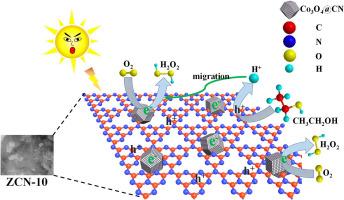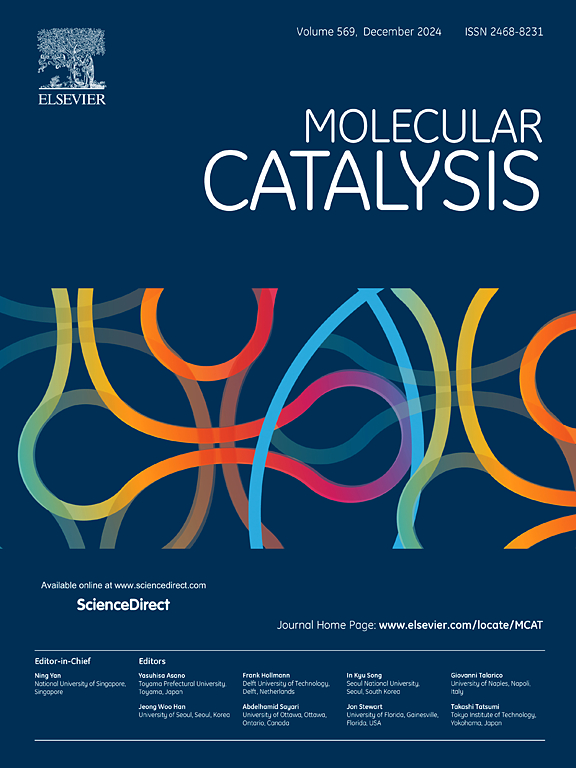ZIF-67 衍生 Co3O4@CN 辅助 g-C3N4 用于高效光催化过氧化氢生产
IF 3.9
2区 化学
Q2 CHEMISTRY, PHYSICAL
引用次数: 0
摘要
光催化技术可将太阳能转化为化学能,由于其清洁环保的特性,也可用于生产过氧化氢(H2O2)。在这里,g-C3N4(GCN)与 ZIF-67 衍生物(Co3O4@CN)通过热处理耦合,首次获得了用于生产 H2O2 的 ZCN-X(X = 5、10、15 毫克 ZIF-67)复合光催化剂。ZCN-10 在一小时内的最佳光催化 H2O2 生成效率为 531.1 μM(或 2655.3 µmol-g-1-h-1),是 GCN(152.0 μM)的 3.49 倍。ZCN-10 在光催化产生 H2O2 方面也表现出较好的稳定性,但在五个周期后略有下降。在 GCN 上引入 Co3O4@CN 增加了催化剂的比表面积、可见光吸附量、表面吸附氧含量和光生载流子的分离效率,共同导致光催化 H2O2 产率的大幅提高。H2O2 生成的机理被证明是两步单电子氧还原反应(ORR)途径。这项工作将为制备高性能的 g-C3N4 基光催化剂提供启示。本文章由计算机程序翻译,如有差异,请以英文原文为准。

ZIF-67-derived Co3O4@CN-assisted g-C3N4 for efficient photocatalytic hydrogen peroxide production
The conversion of solar energy into chemical energy can be realized by photocatalytic technology, which is also used for hydrogen peroxide (H2O2) production because of its clean and eco-friendly properties. Here, g-C3N4 (GCN) was coupled with the ZIF-67 derivate (Co3O4@CN) by a thermal treatment to obtain the ZCN-X (X = 5, 10, 15 mg of ZIF-67) composite photocatalyst for H2O2 production for the first time. ZCN-10 showed the optimal photocatalytic H2O2 production efficiency of 531.1 μM (or 2655.3 µmol⋅g-1⋅h-1) in one hour, which was 3.49 times that of GCN (152.0 μM). ZCN-10 also showed relatively good stability of photocatalytic H2O2 production with a slight decrease after five cycles. The introduction of Co3O4@CN on GCN increases the catalyst's specific surface area, visible light adsorption, surface-adsorbed oxygen content, and separation efficiency of photogenerated carriers, which jointly cause a large increase in photocatalytic H2O2 production. The mechanism for H2O2 production was proved to be a two-step one-electron oxygen reduction reaction (ORR) pathway. This work would shed light on the fabrication of g-C3N4-based photocatalysts with high performance for H2O2 production.
求助全文
通过发布文献求助,成功后即可免费获取论文全文。
去求助
来源期刊

Molecular Catalysis
Chemical Engineering-Process Chemistry and Technology
CiteScore
6.90
自引率
10.90%
发文量
700
审稿时长
40 days
期刊介绍:
Molecular Catalysis publishes full papers that are original, rigorous, and scholarly contributions examining the molecular and atomic aspects of catalytic activation and reaction mechanisms. The fields covered are:
Heterogeneous catalysis including immobilized molecular catalysts
Homogeneous catalysis including organocatalysis, organometallic catalysis and biocatalysis
Photo- and electrochemistry
Theoretical aspects of catalysis analyzed by computational methods
 求助内容:
求助内容: 应助结果提醒方式:
应助结果提醒方式:


